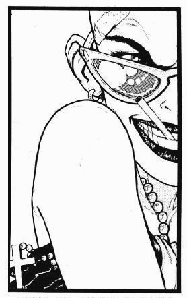Nano Nano

"A nanometer is one-billionth of a meter. That's like comparing a marble to the size of the earth."
So begins the article on Nanotechnology in the June 2006 edition of National Geographic. I've made the assertion before that the Great Green World will be the new wave of the future, allowing us to create a revolutionary technology that will change the world and its economy (again). But Nano might be the god of the new church, bringing us things only science fiction writers dreamed of, allowing us to live even safer, healthier and happier lives. Add that to human enhancement technology, and this world is going to be a very different place in the next 50 years. Think grandma is mystified by today's computers? Just wait till you're a grandma. "May you live in interesting times," the saying goes, which, appropriately enough, can be either a blessing or an admonition.
Definition of Nano from the National Nanotechnology Initiative government website: "Nanotechnology is the understanding and control of matter at dimensions of roughly 1 to 100 nanometers, where unique phenomena enable novel applications. Encompassing nanoscale science, engineering and technology, nanotechnology involves imaging, measuring, modeling, and manipulating matter at this length scale."
Nano is already present in the things we use. Those pants that you can buy that are stain resistant? Flourinated nanopolymer. It's in sunscreeens. On sunglasses. On cutting tools. In wound dressings. The biggest breakthroughs yet will be in the medical field and environmental energy field, where nano will be used to fight cancer and other illnesses, and filter water supplies and supply cheap, efficient energy.
Carbon nanotubes and "buckyballs"--a 60 carbon atom molecule that takes the shape of a geodesic dome ala Buckminster Fuller, discovered by late scientist Richard Smalley in 1985--are, in Smalley's description, 50 to 100 times stronger than steel and 1/6 the weight. Putting nanotubes in epoxy strengthens it by more than 30 percent. Nanotubes are found in high-end tennis rackets, racing bikes and golf clubs. Nanotubes also conduct energy extremely well and could be dropped in cheap chemicals and painted on windows to turn any building into a solar building. In theory, nanotubes could replace all electrical wires since they conduct way more current and lose much less energy in the process. If this technology is ever perfected, entire cities, and even houses, can be wired and powered by solar alone.
Nano is being developed to fight and detect cancer. One goal is to design a test using Nano that could detect up to 20 different cancers with just a finger-prick. Jennifer West, a bioengineer, is battling cancer by injecting mice with gold nanoshells. The gold nanoshells are injected into cancerous tumors, then activated with infrared rays that heat the gold and kill the tumor. The gold is only toxic when heated and will only be confined to the tumor. She has injected the mice with huge doses of nanoshells and not one mouse has died from any side-effects from the treatment.
There are set-backs, however. Scientists have yet to figure out how to manipulate nanoparticles and tubes with ease, so those new energy wires are a long way off. Also, there are concerns of toxicity. But the science is growing and corporations are investing (up to $4 billion in 2006), as this technology has the potential to affect every industry imaginable. It has been called as revolutionary as plastic, a material in almost everything that we take for granted on a daily basis.
I sometimes think we're all going to hell in a handbasket. But it's news like this from the world of science that brings back the dormant hope I've always had in our ability to master our world and create a better quality of life. If the mystics don't blow us all to hell, that is.
My thanks to National Geographic and the National Nanotechnology Initiative for the info I gleaned to pen this post. Visit both those websites (you'll have to buy the June issue of NG for the full story, though) for way more information than either you or I could imagine from this fascinating technology.


1 Comments:
I love stuff like this... I don't understand the finer points, but I love it all the same!
Post a Comment
<< Home